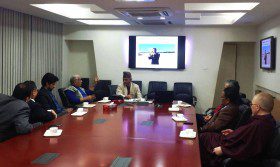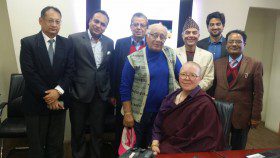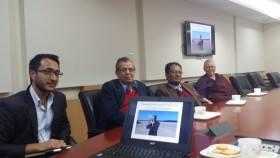 The Harvard Alumni Group of Nepal hosted its 19th monthly meeting on March 10, 2016 in Kathmandu. Mr. Bhojraj Pokharel, currently Coordinator of the Group, gave a talk on “Myanmar’s 2015 Elections and Democratic Process: Some Lessons.” Mr. Pokharel holds an MA in Economics from Tribhuwan University (1976) and MPA from Harvard University (2010). He is a Mason fellow in the Kennedy School. He was the Chief Election Commissioner of Nepal from 2006 to 2009, during which he oversaw the historic 2008 Constituent Assembly elections. He was one of the key architects for designing inclusive and equitable representation of women in the electoral process that paved the path of ensuring more than 33 percent women representation in the Parliament. Mr. Pokharel has also served as Permanent Secretary of various ministries and chaired several major private and public companies in Nepal. He was appointed Member of UN Secretary General’s High Level Panel to oversee the Bangladesh Parliamentary elections in 2008 and Southern Sudan’s Referenda processes in 2010-1011. Mr. Pokharel was co-leader of the Carter Center’s election observation mission, 2015 in Myanmar.
The Harvard Alumni Group of Nepal hosted its 19th monthly meeting on March 10, 2016 in Kathmandu. Mr. Bhojraj Pokharel, currently Coordinator of the Group, gave a talk on “Myanmar’s 2015 Elections and Democratic Process: Some Lessons.” Mr. Pokharel holds an MA in Economics from Tribhuwan University (1976) and MPA from Harvard University (2010). He is a Mason fellow in the Kennedy School. He was the Chief Election Commissioner of Nepal from 2006 to 2009, during which he oversaw the historic 2008 Constituent Assembly elections. He was one of the key architects for designing inclusive and equitable representation of women in the electoral process that paved the path of ensuring more than 33 percent women representation in the Parliament. Mr. Pokharel has also served as Permanent Secretary of various ministries and chaired several major private and public companies in Nepal. He was appointed Member of UN Secretary General’s High Level Panel to oversee the Bangladesh Parliamentary elections in 2008 and Southern Sudan’s Referenda processes in 2010-1011. Mr. Pokharel was co-leader of the Carter Center’s election observation mission, 2015 in Myanmar.
Mr. Pokharel began his talk with a brief introduction of Myanmar and its political history. Myanmar, with a population of around 51 million people, is composed of more than 135 ethnic communities. Burman is the single largest with 60 percent population followed by the Shan, 9 percent, and Karen, 7 percent. Primarily, Myanmar is a Buddhist country but other religious groups are also present. After the country’s independence in 1948, with a few exceptions, Myanmar was ruled by the army. The struggle for democracy has been a long phenomenon. After the 1988 pro-democracy protest, an election for parliament was held in 1990 in which National League for Democracy (NLD) chaired by Aung San Suu Kyi won nearly 80 percent of the parliamentary seats but the army refused to hand over the power to the newly elected parliament. Instead, Suu Kyi was kept under house arrest for more than 15 years.
Present Constitution
In 2008, the military drafted a new constitution safeguarding its political powers. Though this constitution is considered a step forward for the democratic process, it has a numbers of flaws if compared other democratic constitution. For example, 25 percent seats of the total seats in national and regional parliaments are reserved for military. And the army chief appoints sitting army cadres under a reserved category. In Myanmar’s lower house, out of a total 440 seats, elections are conducted only on 330 seats. In the upper house, out of 224 seats, only 168 are elected (12 each from 14 states/regions) and 110 in the lower house and 68 in upper houses are nominated from the sitting army officials. Myanmar, which adopts presidential system, has a provision to elect two Vice-presidents through the parliament. Interestingly, three separate candidates come from their own constituencies, i.e. the lower house elected members will nominate one, the upper house elected members nominate one, and the military nominated representative from both the houses nominate one. The one who secures first vote among three Vice-presidents gets presidential position. And the second largest vote gaining Vice-president becomes first vice president, while the third one is placed as the second Vice-president. Thus, the military has constitutionally ensured at least one position to their nominee.
Additionally, the President himself appoints a Chief Ministers of state/region, which is considered one of the main reasons behind existing conflict in Myanmar. The constitution has a provision to appoint ministers by the President while rights of appointing powerful ministers- Home affairs, Defense, and Border Security – is given to the Army. That’s why key ministers are accountable to the Army, not the people. Any amendments in the constitution needs 75 percent plus endorsement by the parliament, followed by an endorsement of the majority of eligible voters in a national referendum.
Since the military commands 25 percent of the seats, an amendment to the constitution is impossible without consent from the army. Any person who is married to a foreigner or has family members with a foreign passport is disqualified for becoming a presidential candidate. This has barred Myanmar’s democracy fighter and Nobel Peace Award Winner Suu Kyi from pursuing the presidency, as her late husband was British and her sons hold foreign passports.
Under the 2008 constitution, Myanmar conducted its first election in 2010, in which the NLD did not participate. The NLD, however, participated in the 2012 elections where it secured 43 seats out of 44 contested constituencies. Suu Kyi was one among winning NLD candidates. Since then, Myanmar has received a lot of national and international attention during the 2015 democratic elections. The people held high expectations for democratic elections but existing limitations, legislations, and processes were not supportive of it. So, it was a big challenge to meet the people’s aspirations within these limitations. Amid this context, Mr. Pokharel was himself engaged in Myanmar’s elections starting at the end of 2013. His role was to encourage peer sharing on best practices in democratic elections, providing technical support to the political parties to draft an ethical code of conduct to create a level playing field in the election processes.
In spite of the many anti-democratic and flawed legal provisions, restrictive campaign regulations, and an authoritarian set-up, the election process went smoothly and the people of Myanmar participated in the election process in a free and peaceful manner. Following the consultative process, the election commission played a very supportive role by relaxing many restrictive clauses, which were limiting in participating electoral processes. Nearly six thousand candidates, out of whom 801 (13 percent) were women, from 91 political parties, which include 59 ethnic parties, participated in these elections. The results were surprisingly in NLD’s favor. Thirteen political parties are represented in the existing national parliament and NLD alone won nearly 80 percent seats contested in both the houses of the parliament. Women representation remained very low. According to Mr. Pokharel, the people of Myanmar deserve major credit for the success of the election. The role played by the political parties, government, election commission, civil society and the international community, however, can’t be undermined. Still, there are many areas for reform in the election process: making the results more inclusive, providing voting rights without any discrimination, independent appointment of commissioners, and improving the election dispute resolution mechanisms, to name a few.
Challenges for new government
Mr. Pokharel then briefly discussed the opportunities and challenges for the NLD, especially for Suu Kyi in the aftermath of election. People voted for Suu Kyi with high hopes that her victory would transform Myanmar. Expectations include: Ensuring complete democracy in the country; ending decades long conflicts and bringing back the peace, stability and prosperity; creating an inclusive and just society; democratizing and liberalizing state policies, institutions, practices and the mind-set of the authorities; ensuring the basic human rights of its population particularly the Muslim Rohingyas; providing autonomy to the provinces and sharing power; accepting the identities of the minorities. To address many of these aspirations, there is no other alternative but to amend the existing constitution. NLD alone cannot change the constitution. So, Suu Kyi’s failure or success largely depends on how much she will be able to convince the military and other political parties to review the constitution; how and what type of relations she will maintain in managing the main opposition and ethnic parties; how much she will be able to convince her own support base to respect the rights of the minorities; and of course how much independence she will give to her nominee as the President. Addressing the main triggers of the conflicts such as exclusion, power sharing, inequality, poverty, identity, and the autonomy are not much easier, both politically and economically. They will demand extra charismatic leadership and statesmanship on her part.
Lessons for the future
Finally, Mr. Pokharel shared some lessons from this process. Discipline and sincerity for the people and the political parties of Myanmar is praiseworthy. Myanmar has a provision of electing ethnic ministers for any minority populations if their population is more than 0.1 percent of the total population in that state. In 2015 elections, 29 such ministers were elected. This also could be another lesson for integrating and engaging the minorities in state affairs. Decentralizing the election management system and encouraging participation of school teachers, particularly females, as a poll worker could be a lesson for other countries. The major lesson for the global leadership is to learn from the patience and struggle demonstrated by Suu Kyi to restore the democracy in Myanmar by sacrificing her own life.
The talk ended with thought-provoking questions and a lively discussion among the members.
The Harvard Alumni Group in Nepal has recently been reactivated. The group’s goal is to serve as an interactive platform for proactive discussions on topical issues of national and global importance, as well as to promote professional networking among the alumni community in Nepal.
For questions about the group, please contact Bhojraj Pokharel, bhojrajpokharel@yahoo.com


